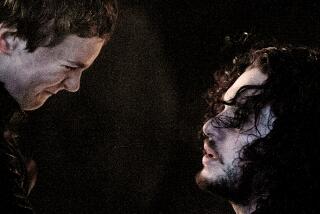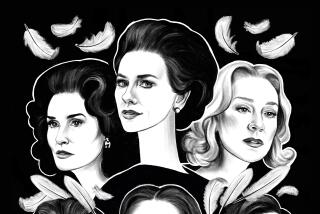Charles Dance on Tywin Lannister’s death and resting villain face
Charles Dance is feeling much better, thank you. Just out of isolation from “this wretched virus,” he’s looking hale and up for a discussion of his role in “Mank” (as William Randolph Hearst), but clearly politics are also on his mind. At 74, he’s a stage-trained actor who broke big in “The Jewel in the Crown” in 1984, then slowly became one of the most reliably enjoyable character actors who seems to be everywhere — “Game of Thrones” and “The Crown,” “Ghostbusters” and “Godzilla: King of the Monsters.” He spoke remotely with The Envelope about the size of “Citizen Kane,” battling COVID and having a resting villain face.
I hope your recent illness wasn’t too debilitating.
It’s not very pleasant. I guess I had a mild version — it was like a bad case of the flu. You feel weak a lot of the time. But let’s not dwell on that. Spring is on the way. It could be a whole lot worse, darling. That awful man could still be in your big White House.
Indeed. So on to “Mank,” in which you’re Hearst. When did you first see “Citizen Kane”?
Probably when I was about 18 or 19. I admired it at the time as a piece of rather extraordinary filmmaking, and I have the imagery of it seared into my mind still. When I knew I was going to be doing “Mank,” I saw it through much more mature eyes. And it is an extraordinary film. I’d forgotten how actually big it was. I had a memory of it being rather claustrophobic, but there are moments that are almost as big as “Ben-Hur.”
Have you ever visited Hearst Castle?
No. It might have been useful for me to go there, from a sense of morbid curiosity. But if someone ever asked me to play Donald Trump, God forbid, I don’t know that it would be important for me to go to this terrible club he’s got down there in Florida where he’s going to be living. There are definite parallels between what we know of the life of William Randolph Hearst and Donald J. Trump, though I think Hearst is in a much better class than Trump.
So was Trump in mind when you decided how to play Hearst?
I did think about Donald Trump. I thought, well, who is the central character [in our modern society] now? Is it Rupert Murdoch or Donald Trump? I bear no physical resemblance to Hearst, nor Orson Welles. Though he did have this peculiar hair arrangement. But this isn’t a film about Hearst; it’s a film about Herman Mankiewicz.
Hearst, as you play him, survives the film. But you’ve actually played quite a lot of death scenes over the years. More than your share, maybe?
I was thinking that the other day — that I’ve died in almost everything I’ve done. It would be nice not to die. There are a few things that I’ve managed to stay alive in — but most of the time, I’ve died a very ignoble death. Especially in “Game of Thrones,” that was quite a death scene, darling.
Ah, yes, Tywin Lannister gets skewered with a crossbow while on the toilet. What were your thoughts on how the series ended?
I was underwhelmed. I thought, “No, come on. Really, guys, you could do better than that.” But, never mind.
You bring a kind of contained stillness to your roles, which I find more effective — particularly in villainous parts — than someone who has to flail all over the screen to get a point across. Is that an intentional thing?
I hope it’s the case most of the time, unless I have a legitimate excuse to flail my arms around and be theatrical. I learned a long time ago the value of that well-worn phrase “less is more.” One of the first actors I noticed and thought, “I’d love to be doing what you’re doing,” was Peter Finch. But I’ve never seen an actor or actress do what Isabelle Huppert does with nothing. You look at her face in close-up, and you won’t see a single muscle move on her face. But a thought crosses her eyes and you know exactly what she’s thinking and feeling. I’m not putting myself in the same league as her. But if I can get close to achieving that, I’ll be a happy bunny.
You played a heroic lead in “Jewel in the Crown,” but it feels as though at some point you began playing more villains. Is that still a good place to be?
I was doing a podcast recently, and I noted that there was a time I was a romantic leading man. But if you seem to be doing something reasonably well, odds are you’ll be asked to do it again. I don’t know what the first villain [I played] was, but obviously, I did it reasonably well. And my face in repose — unless I’m smiling or feeling very, very happy — my face can look rather somber.
So you have resting villain face?
Well, the way it is put together, it lends itself to rather severe characters, often villainous. There have been times when I’ve had enough money in the bank to say, “No, I’m not going to do that; no more villains.” But I think I am going to say it with a vengeance now: No more villains. I think I’ve done enough villainy. Though, they can be enormous fun.
More to Read
From the Oscars to the Emmys.
Get the Envelope newsletter for exclusive awards season coverage, behind-the-scenes stories from the Envelope podcast and columnist Glenn Whipp’s must-read analysis.
You may occasionally receive promotional content from the Los Angeles Times.










